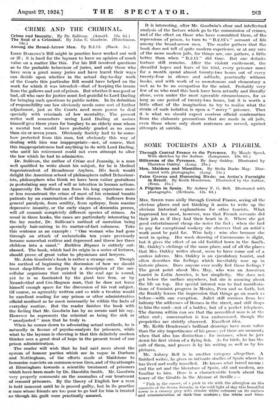- CRIME AND THE CRIMINAL.
Among the Broad-Arrow Men. By B.2.15. (Black. 5s.)
LORD DARLING'S Bill might in practice have worked out well or ill ; it is hard for the layman to have an opinion of much value on a matter like this. For his Bill involved questions as to- the probable behaviour of juries, and only those who have seen a great many juries and have learnt their ways
can decide upon whether in the actual day-to-day work of the Courts this particular Bill would have helped on the work for which it was intended—that of keeping the insane from the gallows and out of prison. But whether it was good or bad,. all who care for justice must .feel grateful to Lord Darling for bringing such questions to public notice. In its definition of responsibility our law obviously needs some sort of further adjustment, just as the Courts need more power to deal specially with criminals of low mentality. The present writer well remembers seeing Lord Darling at assizes himself give three years for burglary to an elderly man whom a mental test would have probably graded as no more than silt- or seven years. Obviously Society had to be some- how protected from this man, but obviously this way of dealing with him was inappropriate—not, of course, that this inappropriateness had anything to do with Lord Darling, who until his retirement could :not even attempt to alter the law which he had to administer.
Dr. Sullivan, the author of Crime and Insanity, -is a man well qualified to write about his- subject, for he is Medical Superintendent of .Rroadinoor Asylum. His .book would delight the American school of philosophers called Behaviour-
. hits, philosophers who- think we have been rather gratuitous in postulating any sort of will or intention in human actions. Apparently Dr. Sullivan can from his long experience more or less reconstruct the crime of most of his criminal lunatic patients .by an examination of their disease. Sufferers from general paralysis, from senility, from epilepsy, from maniac depressive insanity, or the early •stages of dementia precox, will all commit completely different species of erimes. As usual in these books, the eases are particularly interesting to the . lay reader,. Dr. Sullivan's method of narration being specially hair-raising in its matter-of-fact calmness. Take this sentence as an example : " One woman who had gone through an attack of melancholia ten years previously
became somewhat restless and depressed and threw her three children into a canal." Ruthless Rhymes is . entirely out- classed. The book, which had its origin in a series of lectures,
should prove of great value to physicians and lawyers.
Mr. John Goodwin's book is rather a strange one. Though his method of beginning the discussion of how we should treat shop-lifters or forgers by a description of the uni- cellular organisms that existed in the coal age is sound, yet he is so fascinated by the giant tree fern, or by Neanderthal and Cro-Magnon man, that he does not leave himself enough space for the discussion .of his real subject.
Of course, so agreeably written and so wide a treatise would be excellent reading for any prison or other administrative official,confined as he must necessarily be within the facts of everyday routine. But •the reader finishes the book with the feeling that Mr. Goodwin has by no means said his say. However he represents the criminal as being the sick or "unadjusted " man that he truly is.
When he comes down to advocating actual methods, he is naturally in favour of psycho-analysis for prisoners, while what to the layman is cheering is that this definitely modern thinker sees a great deal of hope in the present trend of our prison administration.
The reader will wish that he had said more about the system of honour parties which are in vogue in Durham and Nottingham, of the effotts made at Maidstone to humanize convicts on common-sense lines,and of theattempts at Birmingham towards a scientific treatment- of prisoners which have-been made by Dr. Hamblin-Smith. Mr. Goodwin very properly comments on the anomalies of our treatment of remand prisoners. By the theory of English law a man
is held innocent until he is proved guilty, but in its practice a man whose friends are too poor to go bail for him is treated as -though his _guilt were practically assured.
It is interesting, after 'Mr. Goodwin's clear and intellectual analysis of the factors which go to the commission of crimes,
and of the effect on those who have committed them, of the repressions of prison, to turn to " B.2.15's " account of life among the broad-arrow men. The reader gathers 'that the book does not tell of quite modern experience, or at any rate of the more modern jails, for things are, one gathers, a little better than when " B.2.15 " did time. But one definite torture still remains. After the violent excitement, the dreadful hopes and fears of his trial, every prisoner mast for a month spend almost twenty-two hours out of every twenty-four in silence and solitude, practically without books, and with work of so monotonous and elementary- a sort as to be no occupation for the mind. Probably very few of us who read this book have been actually and literally alone, even under the most agreeable circumstances, for as long- as one period of twenty-two hours, but it is worth a little effort of the imagination to try to realize what the -strain of such isolation is upon a " nervy " prisoner. That it is what we should expect receives official confirmation from the elaborate precautions that are made in all jails, even those where only short sentences are served, against attempts at suicide.


































 Previous page
Previous page